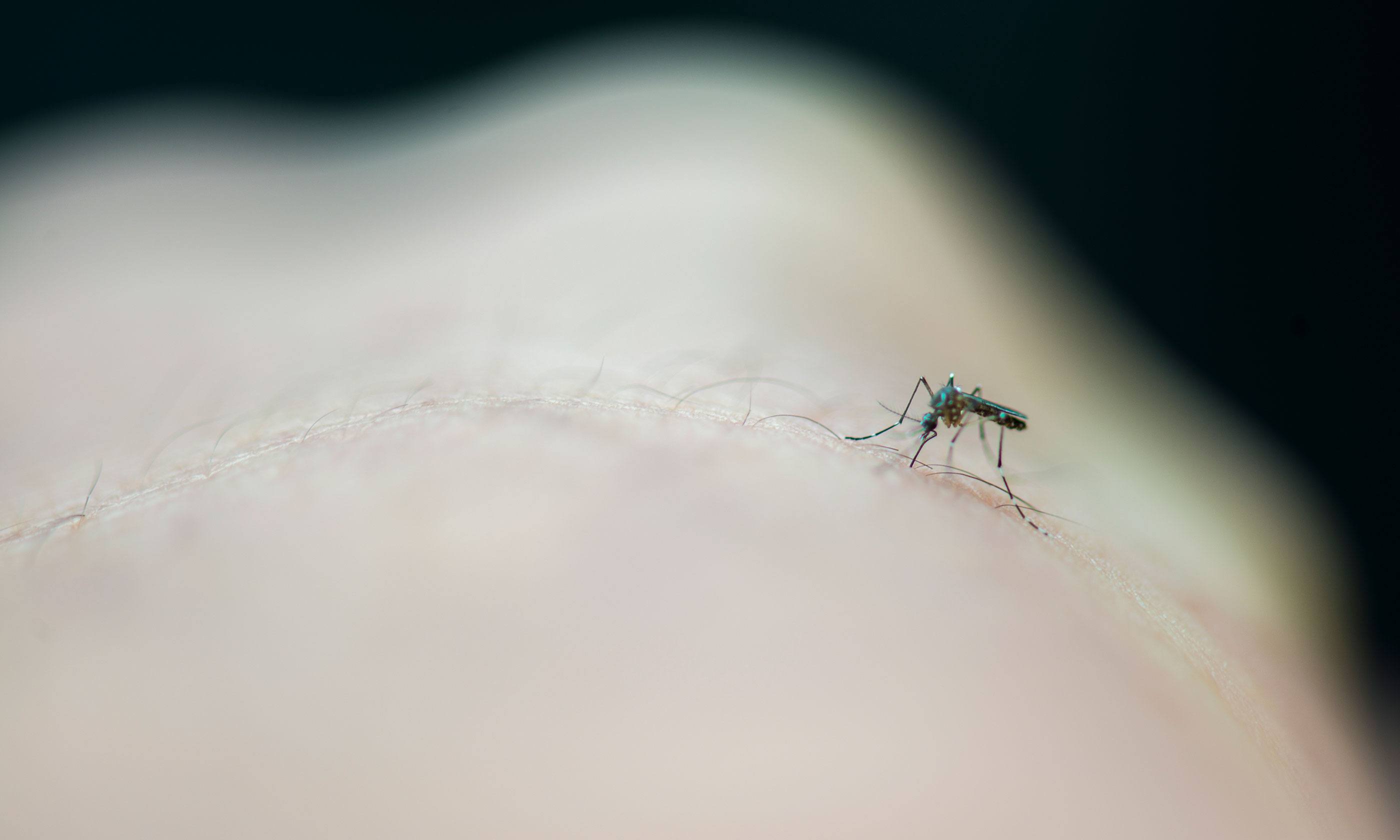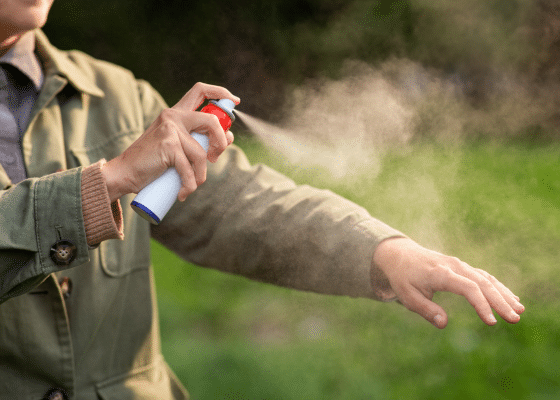
Mosquitoes find some people tastier! One study shows they are more enticed by blood type O than A. (Photo: Airman Magazine via Flickr)
Warmer seasons attract a familiar nuisance: mosquitoes. These tiny buzzing insects are more than annoying. They can leave us with itchy, inflamed bites and, in some cases, carry disease.
Before using chemical-laden repellents, try safer, greener ways to keep mosquitoes at bay. You can soothe bites using simple ingredients you likely already have at home.
What’s the buzz? Mosquitoes in Canada
Canada’s mosquito season runs from late spring to early fall. Most species are pretty harmless. But a few can carry diseases like West Nile virus or Jamestown Canyon virus. They’re now detected more often, likely due to climate change impacts. Warming temperatures and shifting precipitation patterns have created ideal breeding conditions and expanded the range and length of mosquito season.
BITE-SIZED FACTS ABOUT MOSQUITOES
Mosquitoes prefer some people over others
A study found that mosquitoes are more enticed by blood type O than other types.
Only female mosquitoes bite
Females need the protein from blood to produce eggs. Males feed solely on nectar.
Your smell matters
Depending on your skin microbiome and diet (e.g., drinking beer makes some people irresistible) you may be more attractive to mosquitoes.
Three non-toxic ways to keep mosquitoes away
1. Create a mosquito-unfriendly home
Mosquitoes don’t need much to thrive — just warm weather and standing water. You can disrupt their life cycle, attract natural predators and create a safer, more enjoyable space.
- Attract mosquito-eaters. Welcome chickadees, house wrens, bluebirds, swallows, martins with birdhouses and bird baths.
- Put up a bat house. Choose a sunny, sheltered side of your home or garage. A single bat can eat hundreds of mosquitoes in a night!
- Remove standing water. That’s where mosquitoes breed. Refresh bird and bee baths often. Fill, cover or remove items in your backyard that may collect water (e.g., empty planters, kids’ toys, wheelbarrows, etc.).
- Keep rain gutters and eavestroughs clean. This helps rainwater flow freely.
- Repair screens. Check doors and windows.
- Make wind. Mosquitoes struggle to fly in windy conditions. Use a fan to keep them at bay indoors.
2. Grow a mosquito-repellant garden
You don’t need chemical sprays to keep mosquitoes at bay — let nature do the job! Many aromatic plants release oils that naturally repel mosquitoes.
Examples of mosquito-repelling plants:
- Basil (Ocimum basilicum)
- Catnip (Nepeta cataria)
- Citronella (Cymbopogon nardus or Citrosum)
- Eucalyptus (Eucalyptus)
- Fennel (Foeniculum vulgare)
- Lavender (Lavandula)
- Lemon verbena (Aloysia citrodora)
- Lemon balm (Melissa officinalis)
- Lemongrass (Cymbopogon)
- Marigolds (Tagetes)
- Meadow garlic (Allium canadense)
- Rosemary (Salvia rosmarinus)
Integrate these scented plants into your garden or flower beds. They have aesthetic and functional benefits. Some, like garlic and lavender, are also great at deterring “pests” and wildlife visitors. Place potted plants near patios, entryways and windows where you gather or relax outdoors. You’ll create a fragrant barrier mosquitoes will be less likely to cross.
Tip! Many of these are great additions to an edible perennial garden.
3. Become less attractive to mosquitoes
Mosquitoes follow chemical cues and biological signals to find their next meal. With a few mindful changes, you can make yourself less of a target.
- Stay cool. Mosquitoes are drawn to body heat, movement and carbon dioxide. The more you sweat and breathe, the easier you are to find.
- Go unscented or fragrance-free. Mosquitoes love scents from personal care (e.g., soap, shampoo, etc.) and laundry products.
- Cover up. Wear long sleeves, long pants and socks when outdoors.
- Be light and loose. Wear light-coloured, loose-fitting, long-sleeved shirts, long pants and socks. Mosquitoes are drawn to dark colours like navy, black and red. Tuck pants into socks for extra protection — also helps prevent tick bites!
- Net gain. Take a bug net or bug shirt camping. Cover strollers and infant carriers with mesh netting. Don’t use insect repellants on babies under six months.
- Try non-toxic repellants or make your own! Check out online DIY mosquito repellent recipes. They’re often made with cedar, eucalyptus, lemongrass and peppermint essential oils.

What about DEET?
The Environmental Working Group found “DEET is generally safer than many people assume and remains a viable option for people in areas infested with disease-carrying pests. As rates of bug-borne illnesses rise, people need bug repellents that work well when it counts.”
But DEET comes with warnings to avoid eyes, mouth, ears, cuts and irritated skin. For most of us, it’s best avoided, or used only as a last resort with great caution — and never indoors:
- Spray sparingly on your clothes, rather than on your body. (DEET can damage synthetics — plastics, rayon — as well as furniture finishes, leather, and paint.)
- DEET concentration should be no greater than 30 per cent for adults and children over 12, 10 per cent for children aged two to 12 (apply up to three times daily) and 10 per cent for children aged six months to two years (not more than once a day). Never put DEET on children under six months old.
- Always apply away from food and outdoors (not inside a tent) to avoid inhaling the spray.
- Never rinse DEET off in oceans, lakes or rivers.
Seven DIY mosquito bite remedies
Already bitten? First wash your hands and the affected area with soap and water. Then try these simple, natural remedies to relieve itching and inflammation!
1. Apple cider vinegar
Apple cider vinegar has anti-inflammatory and antimicrobial properties. These can ease itching and help prevent infection from scratching.
Dab a small amount onto the bite. Reapply as needed or dampen an organic cotton ball and tape it on for 15 to 20 minutes.
2. Aloe vera
Aloe vera has soothing, anti-inflammatory and antibacterial properties. It can calm itchy, irritated skin and help prevent infection.
Use gel from a fresh aloe vera leaf if available. (If you don’t have a plant at home, check your local grocers’ produce section). Cut the leaf and apply a small amount of gel directly onto the bite. Reapply as needed. If using store-bought aloe vera gel, look for 100 per cent pure aloe vera with no added fragrances and/or dyes.
Bonus? It’s great to have aloe vera on hand in the summer to soothe sunburns!
3. Baking soda
Baking soda is alkaline. That can help neutralize skin pH, relieve itchiness and reduce inflammation.
Mix one tablespoon baking soda with just enough water to form a thick paste. Apply to the bite and leave for 10 to 15 minutes. Rinse with cool water and reapply as needed.
4. Chamomile tea
Chamomile tea contains terpenoids, flavonoids and antioxidants. These can help soothe skin irritation and reduce swelling.
Brew a cup of organic chamomile tea. Let the tea bag steep for at least 20 minutes. Remove the tea bag and let it cool or leave it in the fridge for a few minutes for cooling relief. Apply the tea bag to the bite for 10 minutes. Keep it in the fridge for reuse throughout the day as needed.
5. Honey
Honey is a natural antibacterial and anti-inflammatory agent. It can reduce redness, swelling and speed healing.
Dab a small drop of raw or unpasteurized honey on the bite. Cover with a bandage if you’re going to be moving around to avoid transferring its stickiness. Leave on for 15 to 30 minutes before rinsing with cool water.
6. Ice
Cold temperatures reduce inflammation, numb the area and slow down the histamine response that causes itching and swelling.
Wrap a few ice cubes in a clean cloth and apply directly to the bite for 5 to 10 minutes. An ice pack or bag of frozen vegetables also works. Repeat as needed throughout the day.
7. Oatmeal
Oatmeal contains avenanthramides and gluten which can reduce itching and inflammation.
In a blender or food processor, pulverize a cup of oatmeal into a fine powder. Mix the oatmeal powder with enough water to form a thick paste. Apply to bites and leave for at least 10 minutes. Wipe off with a clean towel or cool water.



